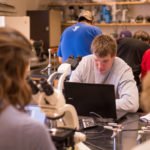Off the Tour: 4 of Cornell’s Lesser-Known Must-Sees
Nestled in the hills of Ithaca in upstate New York, Cornell University’s expansive rural campus is one of the most naturally beautiful and diverse in the country. With 745 acres of land (excluding the Cornell Orchards and Plantations), getting a college tour to take you around to all the sights and sounds that the university has to offer can pose a bit of a challenge.
Granted, some attractions are going to be more advertised by the university than others – almost all Cornell visitors know that they have to climb McGraw Tower or visit the Johnson Museum. But if you’re more of the type who likes to plan your own itinerary, here are a few of the AH team’s favorite attractions at Cornell (which may be a little more off the beaten path).
Want to learn what Cornell University will actually cost you based on your income? And how long your application to the school should take? Here’s what every student considering Cornell University needs to know.
- The Establishment
Cornell’s School of Hotel Administration is one of the best hospitality programs in the world, and that title is definitely not just for show – “hotelies” are meticulously instructed in every aspect of hotel management, from real estate speculation to room service. And one of their required classes just so happens to be restaurant management, where they take what they’ve learned from their culinary theory classes and apply them in an actual restaurant setting with real customers.
One of their assignments for that class involves running the Establishment – the training restaurant for hotelies, located on the second floor of Statler Hall. The entire class is split into groups of three, and each group is responsible for keeping the Establishment in operation for one night in the semester. During their night, each group controls all of the restaurant’s operations, from the menu items to the wine selection to the mannerisms of the waitstaff.
The Establishment is open to the public, and is a good way to sample a variety of eclectic cuisines and even some original culinary creations (courtesy of the hotel students). Each night typically has an ethnic or topical theme that all of the specials are supposed to match – recent ones have included “A Night in the Caribbean” and “Willy Wonka’s Chocolate Factory” – and for a reasonable price, you can enjoy your meal in a refined casual atmosphere overlooking one of Cornell’s main thoroughfares, East Avenue.
However, if you wish to dine at the Establishment, be sure to make your reservations early; it is a reservation-only restaurant, and many popular theme nights quickly sell out.
- The Fuertes Observatory
Built in 1917, the Fuertes Observatory on Cornell’s North Campus was originally home to a survey facility for the civil engineering department. It was then converted to a observation facility mainly used by the astronomy department, but now is mostly an outreach facility open to the Cornell community and anyone with an interest in space. Its main instrument is the Irving Porter Church telescope — a 12-inch refracting telescope — but there are also an assortment of smaller telescopes for individuals to use.
The observatory is open for visitors every Friday, and viewing occurs from dark to midnight on clear Fridays. Tours of the observatory are given regardless of weather, and are led by astronomy undergraduates, graduate students, and faculty. They often point out places of interest in the sky for visitors to look at, as the skies are constantly changing throughout the year.
The staff ask that visitors refrain from using bright lights or flash photography when they’re inside the observatory, and also reminds visitors to dress appropriately for the weather (the viewing deck is unheated) and wear comfortable shoes (the observatory is on a bit of a hill). Children should also be supervised at all times.
Since Ithaca’s weather is so mercurial, it’s recommended to call the observatory ahead of time if you’re planning a visit — more details can be found here.
- Cornell Orchards
Cornell’s agriculture program is one of its mainstays, and a good thing too — the results of its research are absolutely delicious. Many of Cornell’s academic departments — such as horticulture, food science, enology, and viticulture — are all reliant on the orchards as a laboratory and a source of ingredients.
Since New York is known for its apples, much of the acreage in the orchards is dedicated to growing various types of apple cultivars. Apple season typically lasts from August to late April, and during this time, you can buy Cornell’s own organic apples (and other fruits), apple cider, apple pies, and assorted apple-related gifts at the orchard’s market. In an entire season, the orchard sells twenty-seven different cultivars of apple, from well-known ones like Fuji and Gala to Cornell originals, like SnapDragon and RubyFrost.
Cornell owns orchards in Lansing (a town a few miles out of Ithaca) as well as on the Ithaca campus itself; the Ithaca orchards focus more on apples, with some land dedicated to grapes, plums, and berries, whereas the Lansing location is more of a vineyard. The Ithaca location lies about a mile east of where most of the academic and administrative facilities are on Central Campus, across from the Cornell vet school.
The selection of products that the orchards offer are seasonal and change based on weather and growing conditions, so it’s often wise to check on their website before your visit to see what they have available.
- Cornell Cinema
Located in the basement of Willard Straight Hall, the Cornell Cinema screens films five nights a week — Wednesday through Sunday — for the viewing pleasure of students, staff, faculty, and the greater public. The theatre seats 340 people at full capacity, and general admissions costs $8.50 per person with Saturday and Sunday matinees at the student price of $5.50.
The selection of films are usually determined by the Cornell Cinema staff, although their choices draw frequently upon community suggestions. At times, their selections are arthouse and experimental, introducing the fringes of film to a more mainstream venue and a more mainstream audience. Ithaca, having been a popular locale for silent films back in the day, has developed a following and taste for experimental and indie movies, so Cornell Cinema is often a good place to start if you’re seeking to sample the local fare.
Other times, they like to screen more popular blockbusters, so students can see them without paying the high ticket price of off-campus theatres. In the months leading up to the Oscars, for instance, the cinema typically screens all of the nominees for Best Picture. Either way, the cinema’s selection is usually evenly distributed among all different genres and countries of origin, allowing viewers a variegated sampling of the film world.
Whether you’re scouting out Cornell as a prospective school, an accepted applicant who’s deciding where to go, or just a traveler that’s sightseeing, Cornell’s campus — like many other college campuses — is one that’s full of hidden surprises. While this article might not cover all of the surprises that this campus holds, we hope that it’ll take you on the first step of experiencing this campus as a student would, and maybe even lead you to find even more surprises of your own.
Curious about your chances of acceptance to Cornell? Our free chancing engine takes into account your GPA, test scores, extracurriculars, and other data to predict your odds of acceptance at over 500 colleges across the U.S. We’ll also let you know how you stack up against other applicants and how you can improve your profile. Sign up for your free CollegeVine account today to get started!

